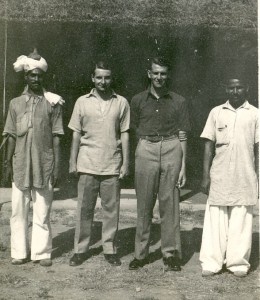Another great new addition to our Lindsay Anderson Archive arrived in Stirling this week in the form of an envelope containing eleven letters written by Anderson to Edmund Papst covering the years 1945-1948. Anderson met Papst while on military service with the Intelligence Corps in Delhi, India, in 1945 and kept in touch with him after the war. The seventy five pages of news, reviews and opinions that constitute these letters cover the period of Anderson’s return from India (including a stop-off in Palestine); his resumption of his studies at Wadham College, Oxford; his work, with Gavin Lambert and Peter Ericsson, on the film journal Sequence; and the beginnings of his filmmaking career in Wakefield with Sutcliffe Engineering Ltd.

The letters provide further information on a period of Anderson’s life that is not as well documented in the collection as his later years as a film director and complement the extensive diary entries he wrote at the time. Anderson writes about his plans for the future and the letters show him slowly moving towards a decision to commit to a career as a filmmaker. In April 1946 he writes:
“What about the future? I can think of no niche in society into which I could fit entirely pleasurably. O for an independent income! Or ten million pounds with which to make films.”
The lure of the cinema was hard to resist for Anderson. In another letter to Papst in June 1947 he noted that:
“I shouldn’t be surprised if, in the end, I tried to do something in films: it’s a pity in a way that one should be interested in them since they are so heartbreakingly commercialised – but devilishly attractive at the same time.”
A letter written in September 1945, when Anderson was on leave in the Tamil Nadu region of India, shows that his confidence in his artistic abilities wasn’t lacking:
“I have become implicated, rather foolishly, in a variety show which the local dramatic society are putting on next week: agonising to have to sit silently and watch the producer bungling everything when I could do it so brilliantly myself.”
On his return to England in 1946 Anderson sent detailed reviews of films and plays he had seen in London to Papst, who was at university in Cape Town, South Africa, at the time. In April 1946 he sent a review of a production of Henry IV Part I at the Old Vic in which he thought Ralph Richardson’s performance as Falstaff “not quite up to expectation.” Twenty five years later Anderson was directing Richardson on stage and screen, in Home at the Royal Court, and in the film O Lucky Man!
